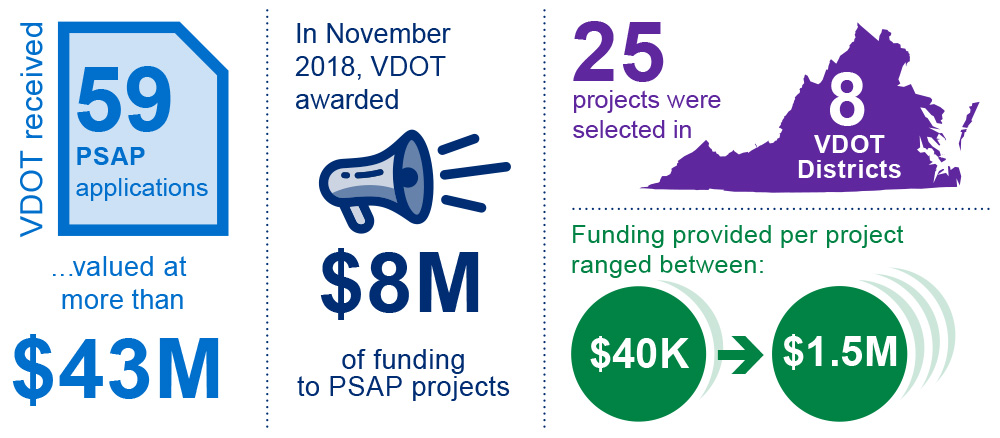October 10, 2019
Innovation of the Month:
Safe Transportation for Every Pedestrian
Last week, we introduced you to the Safe Transportation for Every Pedestrian (STEP) program. STEP is designed to reduce pedestrian fatalities, which account for over 16 percent of all motor vehicle crash fatalities.
Looking at your jurisdiction's pedestrian crossings and roads as a whole—system-wide—is an important first step to understanding your agency needs and potential solutions. Several State Departments of Transportation are already working on or have completed State-level inventory projects or systemic analyses to help make informed decisions with pedestrian safety countermeasures.
The Connecticut Department of Transportation (CTDOT) recently completed its statewide Pedestrian Signing and Pavement Marking Project to improve crosswalk visibility on state maintained roads.
CTDOT is expanding the project to provide funding to upgrade over 1,500 pedestrian crossing locations on locally maintained streets. CTDOT will incorporate data from these sites into a statewide asset inventory of all uncontrolled pedestrian crossing locations, allowing CTDOT to conduct advanced safety analysis and plan for future improvements across the network.
Last year, the Virginia Department of Transportation (VDOT) released its first statewide Pedestrian Safety Action Plan (PSAP), which focuses on sites where STEP countermeasures would improve pedestrian safety. VDOT evaluated corridors according to pedestrian crash history and future crash potential. FHWA supported this effort with training and technical assistance, and after the PSAP's release, VDOT quickly began implementing projects recommended in the plan after identifying funding.

To learn more about Virginia's PSAP, read this recent article from the FHWA Safety Compass.
If you would like to take the first STEP with systemic safety analysis, contact Becky Crowe with the FHWA Office of Safety or Peter Eun with the FHWA Resource Center.
FHWA Final Rule Encourages Innovation in Federally Funded Highway Projects
On September 27, 2019, FHWA issued a Final Rule in the Federal Register repealing the long-standing federal provisions (23 CFR 635.411(a)-(e)) for the use of patented or proprietary products on federal-aid projects; this rule will take effect on October 28, 2019. The Final Rule provides to the states the flexibility to use their procurement procedures when deciding the selection of proprietary or patented materials.
MnDOT Publishes Performance-Based Practical Design Guidance
Performance-Based Practical Design (PBPD) is an approach to road and street engineering that uses newly available data and methods to address problems and achieve project goals more reliably and efficiently than in the past. Recently developed methods to predict expected safety have been a breakthrough in road design, allowing comparison of design options balancing different aspects of performance and costs.
The Minnesota Department of Transportation published design guidance on how to develop projects with the PBPD mindset. An emphasis on how to use the Highway Safety Manual (HSM) to inform decision-making is integrated throughout the guidance.
The guide also addresses specific design controls (such as design speed), cross sectional elements, roadside design, sight distances, and horizontal and vertical alignment. Where available, these sections refer designers to the appropriate section of the HSM so that the relative safety of alternatives or design dimensions can be quantified and expected performance differences better understood.
To learn more about Minnesota's PBPD guidance, please contact Will Stein with the FHWA Minnesota Division. For more information on how your agency can incorporate data-driven safety analysis into its business practices, contact Jerry Roche with the FHWA Office of Safety or John McFadden with the FHWA Resource Center.
Pennsylvania Saves Millions with Mobile Construction Apps
The Pennsylvania Department of Transportation (PennDOT) has saved an estimated $39 million in overall productivity through its mobile construction app program. These savings were calculated based on time saved using apps compared to older paper and manual processes. Program goals include increasing productivity for field staff and field consultants; transforming labor intensive, manual paper processes through efficient mobile technology; and improving data collection and reporting capabilities.
PennDOT implemented its first app in 2013. Today, PennDOT uses nine different apps and has another two in development. The apps cover a wide range of activities, including mobile construction documents, punch lists, concrete inspection diaries, mileage and hour trackers, and payroll.
PennDOT isn't done either. The next step includes implementing e-ticketing, supporting maintenance systems, using radio frequency identification tags, and more.
To learn more about PennDOT's mobile construction app program, contact John Myler with PennDOT. To learn about the e-Construction options that may benefit your agency, contact Kathryn Weisner with the FHWA Resource Center.
About EDC
Every Day Counts, a State-based program of the Federal Highway Administration’s Center for Accelerating Innovation, works with State, local, and private sector partners to encourage the adoption of proven technologies and innovations to shorten and enhance project delivery.


